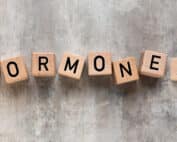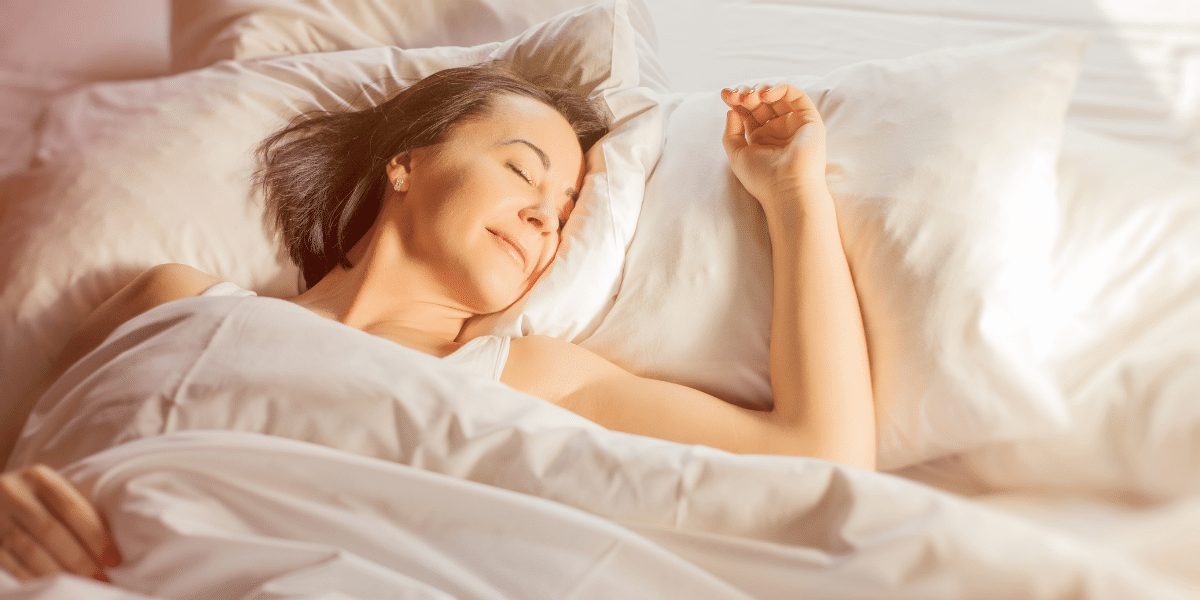Your Hormones: Key to a Good Night’s Sleep. Lack of sleep, difficulty sleeping, waking up in the middle of the night and not being able to fall back asleep are common symptoms my menopausal and perimenopausal women complain about. It’s not in your head, it has to do with your hormones. There are strategies you can implement to get better, more restorative sleep.
Sleep is essential for overall health. If you don’t sleep, you can’t lose weight, make good decisions or be your best self. Many women find themselves irritable and this can damage relationships and career advancement as well as erode self-confidence and self-esteem. Lack of sleep causes accidents, errors in judgment and ages you quicker.
There are common hormone scenarios that can affect sleep. First determine which you have and implement the strategies to bring you into better balance.
Hormones, Neurotransmitters and Sleep
Hormone fluctuations in perimenopause and low levels of hormones in menopause causes a change in serotonin levels. Serotonin, a calming neurotransmitter is implicated in sleep, mood, and hot flashes as well as depression. Minerva Obstetrics and Gynecology journal did a study and found some surprising supplements may help you sleep by influencing your hormones and neurotransmitters.
- Tryptophan the precursor to serotonin, the calming antidepressant neurotransmitter. It is found in turkey, cheese, and nuts. Taking tryptophan at night may improve sleep and mood by boosting serotonin levels that may be due to low estrogen.
- Glycine found mainly in protein-rich food such as meat, fish, dairy products, cheese and vegetables is an inhibitory neurotransmitter in the central nervous system and decreases excitability thereby calming you down. Studies have shown that glycine can promote a deeper level of sleep.
- Resveratrol has a similar chemical structure to estrogen and acts as a phytoestrogen. It has estrogen-like activity and studies found that it could promote better sleep.
- Vitamin E has antioxidant activity. It has been suggested that the oxidative stress may also play a role in sleep disorders.
While these supplements may help, it is best to have your hormones measured to see what is out of balance. Your gut health can also affect serotonin levels.
Progesterone: The Hormone of Peace and Calm
Progesterone is a very calming hormone and has receptors in not only the uterus but also in the breasts and brain. It affects reproduction, sleep quality, respiration, mood, appetite, learning, memory and sexual activity. Progesterone gets broken down in the liver to a form that acts on the GABA receptors in the brain. GABA is a calming neurotransmitter and when the receptor is stimulated it can induce calm and at night is responsible for deep sleep. It has also been shown to be a respiratory stimulant and has been used to treat mild obstructive sleep apnea.
- In younger women, an herb called Vitex agnus-castus, also called vitex, chaste tree, or chasteberry stimulates the pituitary to produce luteinizing hormone which in turn signals the ovaries to produce more progesterone.
- In older, perimenopausal women and menopausal women, oral bioidentical progesterone can decrease anxiety and promote a deep, restful sleep. Seek a doctor who is experienced in bioidentical hormone replacement because progesterone must be balanced with estrogen and the route of administration and type you use matters.
Estrogen Balance for Better Sleep
Too much estrogen or too little progesterone can keep you awake. Estrogen stimulates the nervous system and progesterone calms it down. However, if estrogen is too low, many women get hot flashes or night sweats, and become overheated. This disrupts sleep.
Estrogen usually improves the quality of sleep, reduces time to fall asleep, increases the amount of REM sleep and reduces the number of times a person awakens. It also increases serotonin and serotonin receptors in the brain. Serotonin is a calming neurotransmitter and natural antidepressant and having the right amount can lift your mood as well as help you sleep.
Have your levels measured because the symptoms can be due to other things.
Make More Melatonin: Zoom Out of Blue Light
Now that most of us are glued to our devices, whether it be a computer, phone, tablet or TV, they all emit blue light. This blue light blocks the production of melatonin which is known as the sleep hormone. This hormone also decreases with age and is sensitive to disruptions in the day/night circadian rhythm.
Melatonin regulates sleep and wakefulness. Levels increase in the mid to late evening, remain elevated throughout the night, and drop in the morning. Here are ways to enhance its production.
- Keep a regular sleep and wake schedule. Disruptions of circadian rhythms disrupt not only melatonin production but also the production of cortisol.
- Get light in the morning and dim lights at night. When you sleep, do so in total darkness. Avoid night lights, streetlights through open windows, indicator lights and other light sources.
- Use blue light blocking glasses or use night shift or twilight on your phone or tablet and f.lux on your computer. These are programs that block blue light
- Eat foods rich in melatonin at night such as: tart cherry juice, gogi berries, eggs, milk, fish and nuts.
- Take short acting melatonin if you have trouble falling asleep and long-acting melatonin if you have trouble staying asleep.
- Besides sleep, melatonin has antioxidant and anti-aging properties. It can also decrease the risk of obesity and diabetes as well as the cravings for comfort food associated with lack of sleep. Some studies showed that melatonin can lower the risk of Alzheimer’s Disease as well as Parkinson’s.
Correct Your Cortisol Curve
Cortisol, along with melatonin has a circadian rhythm. Cortisol will peak upon awakening and gives you that get up and go. It should decrease throughout the day and be low at night. Night owls and people who have difficulty falling asleep oftentimes have high cortisol at night. Sleep can be disturbed when your cortisol rhythm is off. To get back in rhythm:
- Get light in the morning and get your heart rate up as soon as you get up.
- Adhere to a regular sleep wake schedule and keep it dark and cool at night.
- Take 2 phosphatidylserine before bedtime to lower cortisol.
- Have a wind down routing and don’t drink caffeine, alcohol, or take anything stimulating too close to bedtime.
- Regulate your blood sugar. Too much sugar or carbs with cause insulin spikes and blood sugar crashes that interfere with cortisol and sleep.
- Calm your mind with deep belly breathing, meditation, or relaxation techniques.
Sleep is essential and there are many things that can interfere with it. If you are having difficulty sleeping or hormonal issues, consider and evaluation by a functional medicine doctor such as Dr. Maita. You can apply for a free clarity call on the contact page of her website HowToLiveYounger.com to determine if her approach is right for you.






She is a recognized and award-winning holistic, functional, integrative and anti-aging healthcare practitioner, speaker and author, and has been featured in ABC News, Forbes, WOR Radio and many media outlets to spread the word that you can live younger and healthier at any age.